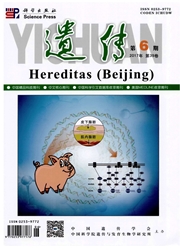

 中文摘要:
中文摘要:
转化生长因子β(Transforming growth factorβ,TGF—β)超家族包括TGF—β和骨形态发生蛋白(Bone morphogenetic protein,BMP)两个亚家族。TGF-β超家族信号通路的配体、配体拮抗分子、受体、信号转导分子均在软骨内成骨过程中发挥各自独特的作用,参与调控软骨细胞的谱系分化、增殖、成熟、凋亡和矿化。BMP信号能起始问充质细胞向软骨细胞分化并维持软骨细胞的特性,在软骨发生过程中起主导作用;在生长板发育的过程中,BMP信号促进软骨细胞的成熟,促进成骨,而TGF-β信号抑制软骨细胞的肥大分化,维持生长板中适量的软骨细胞;TGF—β信号和BMP信号对于关节软骨的维持和修复都是不可或缺的。因此,TGF-β超家族的重要作用贯穿骨骼发育过程的始终。
 英文摘要:
英文摘要:
The transforming growth factor β (TGF-β) superfamily is composed of TGF-β subfamily and bone morphogenetic protein (BMP) subfamily. The ligands, ligand antagonists, receptors and intracellular transductors that engage in the TGF-β superfamily signaling pathway play their unique roles during endochondral ossification via regulating the lineage differentiation, proliferation, maturation, apoptosis and mineralization of chondrocytes. BMP signaling dominates chondrogenesis through initiating the chondrocytic commitment of mesenchymal cells and maintaining the chondrocytic phenotype. During the development of growth plate, BMP signaling promotes the maturation of chondrocytes to facilitate ossification, whereas TGF-β signaling inhibits the hypertrophic differentiation to preserve adequate chondrocytes within the growth plate. Both TGF-β signaling and BMP signaling are indispensable for the maintenance and repair of articular cartilage. Therefore, it indicates that TGF-β superfamily may function essentially all throughout the development of skeletons.
 同期刊论文项目
同期刊论文项目
 同项目期刊论文
同项目期刊论文
 Accelerated re-epithelialization in Dpr2-deficient mice is associated with enhanced response to TGF-
Accelerated re-epithelialization in Dpr2-deficient mice is associated with enhanced response to TGF- Altered Gene Expression in Articular Chondrocytes of Smad3ex8/ex8 Mice Revealed by Gene Profiling Us
Altered Gene Expression in Articular Chondrocytes of Smad3ex8/ex8 Mice Revealed by Gene Profiling Us 期刊信息
期刊信息
